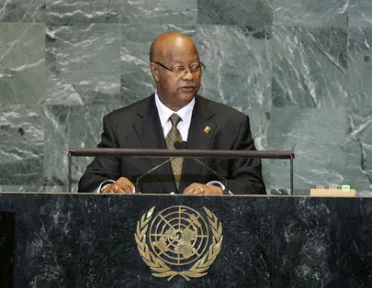Statement
Statement summary
CARLOS GOMES, Prime Minister of Guinea-Bissau, opened by noting that six months after the crisis provoked by the assassination of his President, the country had restored “constitutional normality”, and the organs of State power were in a position to fulfil the role given to them by the country’s Constitution. A new President, democratically elected in elections deemed to have been free, fair and transparent by all political parties and candidates, as well as by international observers, had been inaugurated.
The assassination of the Head of State and the Chief of Staff of the Armed Forces had shocked Guinean society and the international community, he said. The Government had immediately ordered the creation of a committee to find out the truth and hold the perpetrators accountable. Later the Government had requested the United Nations Secretary-General to carry out an international survey. The Secretary-General had urged the Government to continue its investigation, offering to intervene with the African Union, Economic Community of West African States (ECOWAS) and the Community of Portuguese-Speaking Countries (CPLP) for technical and financial support. The Government had requested such support but had not yet received a response. He said the Government was unequivocally against impunity and would do everything in its power to create the conditions for the committee to carry out its work in a peaceful, transparent and credible manner.
He said those events had caused a serious crisis in the country that had lead to a radical change in priorities of the Government’s policy -- namely, the necessity of holding presidential elections. However, despite the gravity of that situation, the response of the country’s institutions was swift and positive. In Guinea-Bissau the creation of the Armed Forces had preceded the creation of the State itself and the latter ended up inheriting the burden of complex problems arising from the existence of an armed struggled for national liberation. Like other countries that had a similar past, he pointed out, problems associated with that condition were not easy to overcome, especially when facing survival issues that plagued all society. It was with that awareness that the Government had held last May, with the assistance of development partners, the United Nations, ECOWAS and others, a round table in Praia, Cape Verde, to jointly evaluate the proposed reform programme for the defence and security sectors.
Continuation of the reform programme in the military and security forces, within which the establishment of a special pensions fund was planned, especially designed to deal with those issues, could contribute to solving those problems once and for all. Additionally, the Government had just concluded a thorough assessment of its national strategy for poverty reduction. The results of that evaluation allowed the Government to conclude that it needed to strengthen its action on all the areas that defined the strategy. It also enabled the country to determine that the biggest impediment to development lay in the energy sector. In that regard, he asked Guinea-Bissau’s development partners that the interim review of the country’s strategy to reduce poverty and its respective programme was carried out as soon as possible, so that the country could organize, together with its partners, a round table to address the need to strengthen the technical, economic and financial cooperation programmes with his country.
Mr. Gomes also stated that the concern with the stability in the subregion and the world at large, and with devoting more attention to the promotion of development, led Guinea-Bissau to welcome with satisfaction, and encourage the policy of United States President Obama towards Africa, recently clarified during his visits to a number of African countries, as well as the peace initiatives that were under way in the Middle East under United States patronage. “We also welcome with satisfaction the United States Administration’s policy towards Cuba, hoping that the lifting of the embargo may occur in the short term,” he added.
Continuing, he said that for many years his country had been asking its development partners for a post-conflict programme for Guinea-Bissau. A country with such severe shortages as his should not be abandoned to its fate, knowing the profound consequences that the political-military conflict of 1998-1999 had left all sectors of the socio-economic life of Guinea-Bissau. He was therefore particularly pleased with the attitude of the African Development Bank, which had turned an important part of the financial resources available to Guinea-Bissau into donations. Similarly, Mr. Gomes welcomed the recent decision by IMF and the World Bank to negotiate and conclude a post-conflict programme with the country’s Government. He was hopeful that new and dynamic level of cooperation would enable Guinea-Bissau to benefit from the initiative for debt relief under the Heavily Indebted Poor Countries (HIPC) Initiative.
He said that, as Prime Minister, he would strive to put his country on “the path of peace, national reconciliation and development”. All the commitments made by his Government would be respected in peacebuilding dialogue, poverty reduction and creation of conditions conducive to economic growth. He asked the international community to help provide a new opportunity for a “true partnership towards sustainable development”.
Full statement
Read the full statement, in PDF format.
Photo

Previous sessions
Access the statements from previous sessions.
